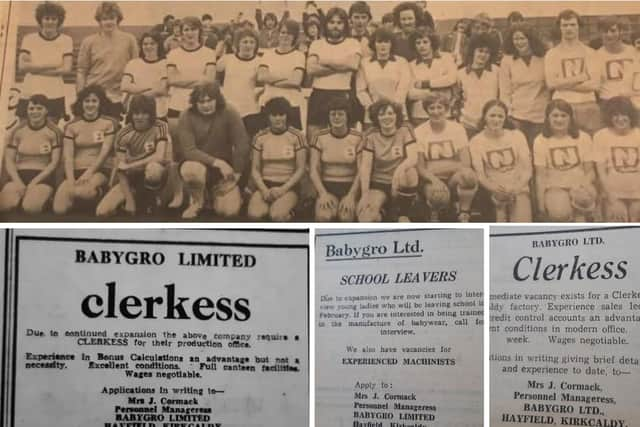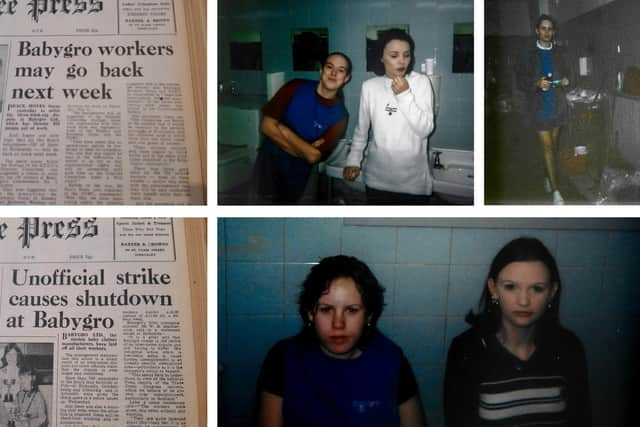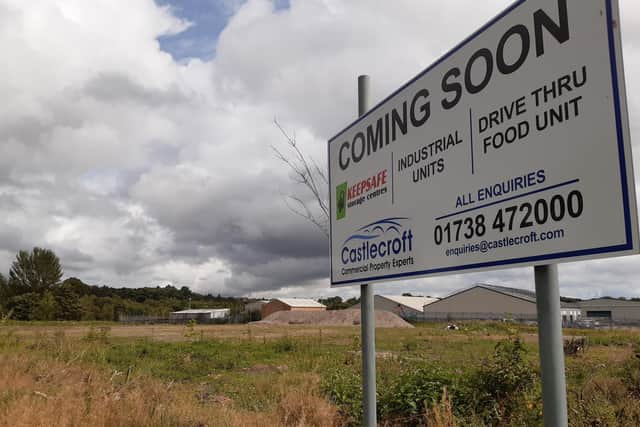Babygro: memories and friendships endure from forgotten Kirkcaldy factory
and live on Freeview channel 276
Now, one of Fife’s ‘top 100 businesses’ has pitched plans for a new drive thru facility on the site of the former Babygro factory in Kirkcaldy. If approved, the Stephen’s Bakery outlet would be built alongside a containerised storage facility and five business/light industrial units.
The planning application to Fife Council - which will come before councillors in due course - sparked memories of one of the town's many long-lost factories.
Advertisement
Hide AdAdvertisement
Hide AdBabygro operated for decades, employing multiple generations of proud Kirkcaldy residents - primarily women. The building has been gone for more than 20 years - the business has been shuttered even longer - but the legacy of Babygro lives on for many.


“Babygro was such a big part of a load of people’s lives in Kirkcaldy then it just disappeared. It was where so many memories and friendships were made. People had their first pregnancies and so many things happened during that time,” former employee Nikki Taylor, 48, said.
The factory:
Babygro was a Scots-based clothing firm employing hundreds of people to make clothing for children. The factory primarily made onesies and pyjamas for Marks & Spencers. It operated from the 1970s all the way until the early noughties when bosses at Delta Babygro claimed the factory in Kirkcaldy was too expensive to run.
An archive report from 2002 said production was switched to the Middle East and Romania to cash in on cheap labour. More than 100 jobs were lost during the final death knell.


Advertisement
Hide AdAdvertisement
Hide Ad“It was part of our lives. It was a big turning point for me. To see the building razed was a wee bit sad,” she said. “Now it’s just a big empty space, but when I drive by I can just remember the times we’d be sat outside the factory door enjoying a cigarette. I see that bit of land and I think of the times we just stood there counting the seconds.”
Memories of Babygro:
Ms Taylor recalled that people of many different ages and backgrounds worked at the factory. However, the vast majority of employees were women.
“You could probably count the men on two hands whereas the women were in the hundreds,” Nikki said. “Some people like me would come in quite young, but other people spent their lives there. There were grandmothers, mothers - people we called grown adults.”


Ms Taylor worked alongside Suzanne Rosiak, 48 and Alice Campbell, 45, as machinists in the early 1990s. Their friendships have stood the test of time; a common thread through many Babygro memories.
Advertisement
Hide AdAdvertisement
Hide Ad“We had the best social life and met loads of good friends who are friends for life,” former employee Teresa Michalska said. “We all still talk about the Babygro days. After work on a Friday we all usually went to the White Heather then down the High Street for more refreshments.”
For some, Babygro may simply represented a bygone era for Kirkcaldy - the age of thriving high streets and industry. However, for many, it brings back memories of hard work, of friendships, first, second and third pregnancies, engagement rituals, smoke breaks, petty cloakroom gossip and much more.
Former employee Tina Page worked at Babygro in the 1970s when she was just 16-years-old.
She said: “I remember girls getting dressed up as a baby and put in a cage, being pushed round the factory and we all threw money in the cage. It was her blackening, a process all girls went through on their last shift before their wedding.”
Advertisement
Hide AdAdvertisement
Hide AdShe continued: “I also remember the horse trough - it's what the girls called it - which was a wooden square where everyone went to smoke. It was a very busy area back in the 1970s.”
Ms Taylor’s relative, Elaine Weir, worked there from 1977 all the way until it’s closure in the noughties.
“I loved Babygro. We had lots of laughs and the social nights out were amazing,” she said. “I worked with some amazing people - it felt like one big family and we all had each other’s back.”
Ms Weir also recalled coming to work hungover once as a young woman and said the older employees kept bring her cups of tea to get through the day. “So many happy memories,” she said.
Advertisement
Hide AdAdvertisement
Hide AdWhile many generations worked in the factory, other generations of Kirkcaldy children were clothed in Babygro clothing bought and made by their mothers and grandmothers. Jean Allan recalled that her mother-in-law worked at Babygro for many years and said her three girls “lived in Babygro when they were young.”
There were also countless tales of Christmas parties, nights out, smoke breaks, and a grainy image portrays the Babygro football team amongst many others.
Hard work:
Many former factory workers fondly remember their Babygro days , but the job was also hard and demanding. Workers started on a training line learning to sew. When they graduated to production lines, they had to meet a strict production quota on strict deadlines or else the higher ups would take disciplinary action.
“During work times, you were being as productive as possible because you had to make your minimum. We got a sticker for every piece of work we completed. You had to have eight stickers to complete your work. If you did more than that, it was extra pay,” Ms Taylor explained.
Advertisement
Hide AdAdvertisement
Hide Ad“But you had to work like mad to make your minimum wage. Everything was so strict and your work had to be perfect. Anything that wasn’t perfect or in the right size got rejected.”
Ms Weir recalled: “I started on the sewing machines but by the time I finished sewing a babygro it was fit for a wee doll because I had cut so much off.”
She continued: “You had to go like the clappers to make your pay and if there was a slight flaw they got binned. Later they decided to have sales for anything that wasn't 100%.”